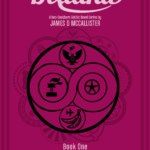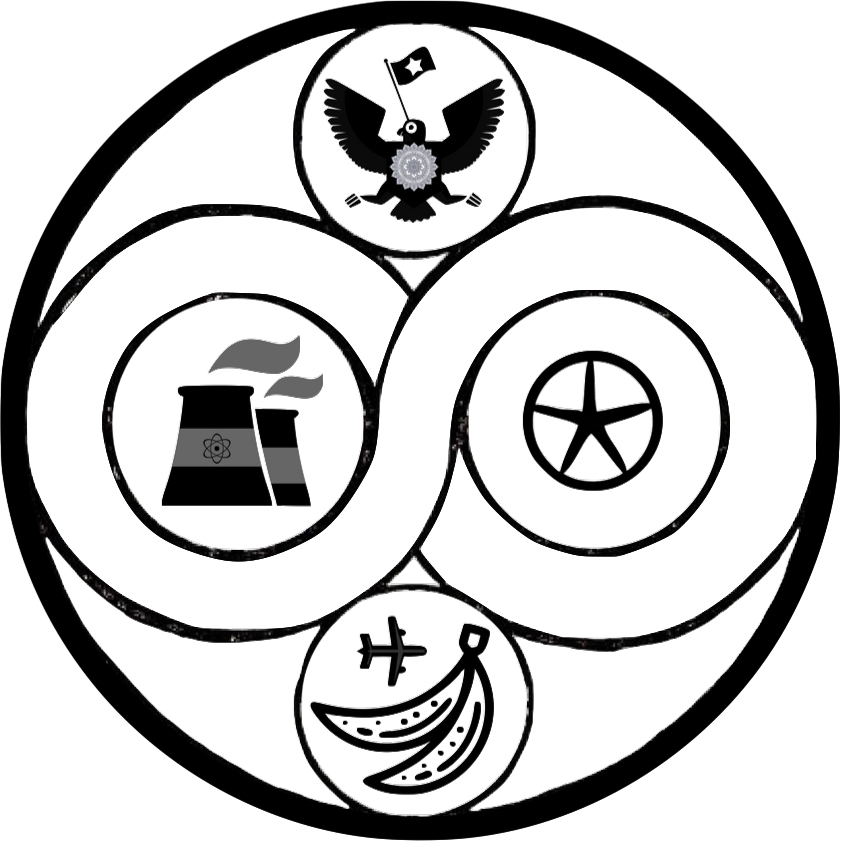DIXIANA Preview: The Fourth Chapter

In this fourth Dixiana preview installment, here at last is one of our favorite characters, Button Sykes.
She’s pretty out there, sure—besides a heady past of drugs and Phish tour, what hasn’t she looked into in terms of esoterica and occult philosophy? But hey, her heart is in the right place—she serves her family, including cranky, drunken grandfather Burnie Sykes.
These introductory passages give but a taste of this quirky character, whose poignant journey through the nine volumes of Dixiana is certain to be memorable for all future readers of the series. The author has rarely loved one of his characters as much as he loves Button, that’s for sure.
For the previous three chapter previews, click here, here, and here. Thanks for reading. Dixiana, Book One: Dirt Surfer drops next month! Whoa!
4. Button
Having penetrated the subtleties with sufficient proficiency but to no beneficial effect, once again Button Sykes carried her grimoire, a text filled by page after page of ritual and sigil and incantation, to the riverside park for disposal in the cradle of nature. Setting her intention to one of release and finality, she brought along a purple Bic lighter to spark the cursed notebook aflame. Here in solitude, she hoped dispelling the book’s magnetized energies into ashes and dust would harm the fewest other human beings.
Done with it all.
Yeah. Magicking, it had run its course.
Except for the powwow Uncle Rabbit taught her. Which she considered trying on her own aching back. He cautioned, however, that this sort of hex magic involving symbols and semantics—performed in this case to heal oneself—represented the most difficult to pull off. Powwow, he said, must at some essential level be about service to others.
Eh—not another discipline. She’d been through so many. A depth of esoteric knowledge, true, but master of no worlds.
As the epigraph on the first page of her grimoire advised in her own spidery scrawl, with words courtesy of Blake:
If you have formed a circle to go into,
Go into it yourself and see how you would do.
How she had done: No workings seemed to fluoresce as they should; her myriad approaches and attempts at placing her size-five feet on either side of a dividing line between two worlds only attracted the stink of failure rather than mastery of the subtle energies. She’d been stuck for months working on fully entering the astral plane through lucid dreaming, and with precious little success. Dweller upon no thresholds.
But escaping misfortunes, avoiding a hundred ills, with good tidings ahead, yeah: Button felt safe and remained on her Way to a state of superior immortality. When the time came of full manifestation, she would evade death by stepping into another life. How it worked; the alchemist’s true goal.
Still, she’d heeded the warnings found in every esoteric text she’d studied, from the Picatrix to the theosophists and Crowley and beyond—that, the practice of so-called white magic still retained enormous capacity to attract malicious actors alongside ostensibly benevolent ones. But maybe not enough heeding, yo.
A truism: what magic has done, it should also be able to undo.
But for whatever inscrutable reason, at the last minute—like the time before, and before that, a few weeks ago when she’d first seen the face of a simian-like entity peeking in through the purple veil of her morning meditation, a little Pazuzu sneaking in from an unguarded seam, a demon but more on the impish side—she’d left the handwritten softcover notebook in her Subaru. Parked in the small gravel lot of the Sugeree Riverside Trail Loop, secluded and scenic not far below the old mill, a concrete walking path laid along the sloping, stony riverbank a few miles outside Tillman Falls, she said, the grimoire survives another attempt on its life.
Like it possesses a will of its own.
She shuddered: The banishing ceremony may have lost its punch. Her defenses, weakening.
Magicking—it had only led to more self-doubt.
Retain the grimoire; but keep it closed. Go back to the Eastern stuff, the Taoism, the Confucianism. Completing the elixir pill, the ultimate melding of sense and essence, body and mind, spirit and energy. Culmination of this sacred process, working the bellows of heaven and earth, taking up the apothecary scale of fire and water, had seemed so close. But in a fit of impatience, she ditched it all to win back the heart of Heather Ponderview by any means necessary.
Suffering a bout of self-consciousness, and perhaps a tumble backward into a kind of paranoia the writer Robert Anton Wilson called Chapel Perilous, a period of uncertainty about what was and wasn’t real and out of which a psychonaut emerged either paranoid or comfortably skeptical, she kept thinking she ought to burn her book of workings and rituals, cobbled together from quite a few obscure texts from deep in the antiquity of occult letters.
But like, enough already. Enough with the magicking and turning the Tarot cards and walking around trees a dozen times repeating incantations. It was time to get real. Time to enact some grass-roots activism, some down-home realpolitik, some agitation, some preaching on matters earthly rather than ethereal.
Time for tangible matters.
Wasn’t it?
Deciding it better to not-know than to stand waiting for some all-encompassing answer of answers likely to never arrive, Button beep-beeped the door lock, shoved in the ear buds and entered the park gate to begin her power walk, long-ass bundled dreads shaking snakelike and bouncing against her back and buttocks, an off-tempo counterpoint rhythm to that of her footsteps as the concrete trail descended through old-growth trees toward the riverside. In her fireplug of a physicalized form, as she thought of the body now whittled down from its traditional stoutness, she felt pride—a dangerous emotion. For once, admiring the sight of her naked self in the mirror rather than repulsed. Liking herself, for almost the first time in her life.
A reason to walk beside this river of forgetfulness, its waters like that of the Lethe rather than the Sugeree; motivation to walk harder, to bolster her commitment to good health.
Daily.
Commitment.
As with her numerous other practices. Whichever ones she planned to keep on practicing.
Some magicking worked, but to what ultimate result she knew not. As Sylvan Muldoon advised in his seminal 1929 text Projection of the Astral Body: throw away reason and try experiment.
What had worked, or seemed to? Her beloved and unrequited college paramour Heather Ponderview, once again in reasonable proximity, a fondest wish conjured. Heather had moved back to the East Coast, only a state away, once again living at her rich father’s mountaintop estate near the North Carolina and Tennessee border. Deep woods; snakelike roads leading around curves and up grades until the population density fell below that of the Sasquatch who probably lived in those hollows.
They’d camped there as college-age lovers. Twenty years ago.
The ache—the dreadful ache in her gut, in her side. Heartbreak, no joking matter.
Button performed an entire working, a year’s time and energetic investment, to get Heather back. A move three thousand miles closer had to represent a sign the needle was moving.
But at what cost? The possible attraction of Archonic influence, like the little creep poking its snout into her meditation?
See? More bullshit. She had to try for something real. Lest she start to think she might actually be nuts. Or sick. Or something.
Shut that fucking nuclear plant down. There we go. That’s what she would do. Its wicked, ever-present plume of steam floated omnipresent not far downstream from the concrete path, a remote county park where Button exercised her way through the waterside woods. While not a practicing Christian, Button made the sign of the cross with her thumb and forefinger three times in the direction of the nuclear plant, a hex of protection the old man taught her.
And so now what did they have in mind?
Oh, yeah.
Building more reactors.
Wait—what?
You heard that right. Hah. Hah. Hah—madness, that’s what.
Now she knew, at least. Knew for sure.
Not that the power plant was killing—she could take that part as-read. No. What she knew. For sure. Was this: She’d found a purpose, one different from the last ten years spent as caretaker to family members suffering degrees of decrepitude and disease.
Unfair to herself—this service, it is a sacred duty. Reminds herself of this daily, she does.
And before that, her dying father’s brutal slog through terminal cancer, a fatal traverse engendering horrific suffering and indignity. Which meant that everyone in the house suffered. For him, and with him.
After he finally passed away in ’12, Button had taken time to go back to something of her old routine prior to the horrible year of his decline and death: trips down to Columbia to the hipster coffee shops there around the campus, strolling among Southeastern University’s storied buildings, old and new, that sprawled across that part of the city, journaling and sketching and storyboarding little mind-movies, and wondering if she shouldn’t have finished her degree in Columbia like her family had wanted instead transferring to Foothills State, that crunchy granola school, as her grandfather called it, in the mountains of North Carolina. All problems and issues had flowed from that decision.
Hadn’t they?
Button, refusing to enter the mental palace of ancient recriminations about having decided this or that or the other thing, deep in a receding past; not this morning here by the shimmering and gurgling river, on the walking path by the old mill along the lovely stretch before the canal area downstream, and the nuclear station beyond. Where the profane reign of the devil unleashed on Earth, in all due radioactive splendor, glowed on unabated.
They talked about the post-9/11 world; what Button Sykes wanted to discuss was the post-Fukushima world. What had happened over there? The Fukushima Daiichi tsunami and subsequent, ongoing nuclear disaster. Years since the tsunami, now. Didn’t hear much about the crisis, except in alternative media.
But then, much had occurred in the atomic age that rarely got discussed: what had happened to all the radiation released during the era of above ground atomic testing? Where did it go?
When did rates of lung cancer worldwide increase? Maybe it wasn’t cigarette smoking—well, it had to be cigarette smoking. She’d heard the tobacco companies encouraged the use of irradiated fertilizers, and this was behind all the lung cancer, not so much the smoking part.
But she couldn’t go down that road; she’d known so much cancer—her father, others. They all lived near the nuclear station. It was epidemic; it was obvious.
Thank god she’d been working out hard for a year or two now, otherwise she might attribute her weight loss to disease, a tumor consuming more than its share of resources, sucking her dead like the growth in her father’s neck and chest.
No, that wouldn’t happen to her; in control. Mental discipline.
You had to be careful. You couldn’t think about ‘cancer’; you shouldn’t say the word, or let the idea take hold in your mind, lest you manifest this into reality inside your own body. The way so many were manifesting diseases, their fleshy vessels reflecting the state of the planet, of Gaia herself who so suffered the depredations and profane incursions of its principal controlling species swarming ant-like, inventing ever more complex technologies that produced ever more refined and toxic wastes, and all of it so unnatural, with nowhere to go, so removed from the natural balance: the four elements. An equipoise that’d been perfect before womankind had existed. And would be so again. After her demise.
The concept of mental discipline applied to other maladies besides cancer, which itself represented many other diseases, an umbrella term. Any way you cut it, the mind could be held responsible; similarly, the mind could also stay in control of matters. Keep the body healthy. You had due diligence in terms of diet and physical activity and other aspects of human physicality, but mental fitness a crucial, foundational building block of any one person’s health and general state of reality.
Be worth thinking herself into cancer. Hah. Just to help make the point.
For all your mental discipline, you get some silly ass thoughts sometimes, GF.
But her thinking regarding the knowledge to which she’d been led, it went far beyond nuke plant radiation. If she went all the way with what she believed—that she’d been chosen for transformation and spiritual growth by angels who visited her during her deep meditations and sang their songs she decoded into true gospel—no one would listen. It would be all-too-much, as the Beatles sang, in revealing these truths about reality as she now understood them. They’d dismiss her as a whackadoodle.
Worse: They’d put her away.
Again. Like at sixteen when she’d received a diagnosis of ‘defiance syndrome’ and found herself committed to a behavioral facility full of junkies and the mentally ill.
Actual whackadoodles. How she’d hated her father over that.
Had wished him dead.
A stab of panic.
Can’t go there.
Forget everything else. At least with the no-nukes proaction, she had plenty of compatriots around the world. Not that the PTB—the Powers That Be—held any truck with allowing truthtelling activists, however guided by angels they might be, to reach enough hearts and minds to the point that anything of substance would change and humanity would move on from this destructive cycle instead of perpetuating it. They who controlled the language controlled history, offered their version of the truth. A tough row to hoe for an insignificant woman like her, in a place like Edgewater County.
How her misguided attempt at educating the Dixiana open mic audience went over:
Lanky old Trudy, as much of a fixture as any other aspect of the old honkytonk, and an authority figure with a no-nonsense management style that struck fear into all who dared cross her, mounted the stage. The crowd, bustling, quieted.
“Look here. We got a special treat tonight—I know y’all’r here to hear some pickin’, and all. Right?”
Hooting and hollering came the response.
“And I am, too.” She cleared her throat. “But first, we got ourselves something—different. Y’all put them hands together for our own Button Sykes.” Trudy, squinting, consulted a blue index card. “Um. The Wicked High-larity of Button Sykes, y’all.”
A reasonably robust response—polite, but far from sustained. Jasper Glasscock, with a sour and impatient expression and a limited edition Lester Flatt D-28 Martin guitar resting on his big gut, watched from the bottom of the wooden stairs off to the side as Trudy, with a vibration of disapproval and mistrust, gestured toward Button.
She jogged up the stage steps and over to the center mic like a game show host, Trudy scampering out of the way. “Right on right on right on—I sure appreciate y’all letting me lay my tight twenty on The Dixiana audience tonight.”
Silence; a shuffling of feet and chairs and clinking of beer bottles. Conversations bubbled back into murmuring audibility.
Working her fist and stalking the stage, she wound herself up. “So, like, I went away for a long time, but since I came back to Tillman Falls, I’ve been running front of house here, yo.” Scattered applause. “I guess those of you who come out to these gigs know this. Yeah—I see a lotta familiar faces out there. And so maybe you trust me enough to lay this here comedy-rap on y’all. Yeah,” doing beat-box on her chest with the mic. “All right! All right!”
Her rap rang hollow—the energy hadn’t risen to meet hers. Thrown off her game by the silence, she nonetheless pressed onward.
Normally she spoke in a halting manner belying her inner thoughtfulness, while well illustrating to anyone who knew her an undeniably robust history of experimentation with various psychotropic substances both synthetic and otherwise. Onstage, however, her words, born of conviction as well as thoroughgoing rehearsal at home, came tumbling out. After working on the routine, she’d opened her circle and cast a spell for loquacity. Just to be sure.
“But I ain’t up here to do that kinda comedy. I appreciate it, y’all, but this here ain’t that kinda routine.”
“Get to the routine, then,” a voice called out. “Cause you suck.”
“All right already, keep your panties dry. I got something here that don’t just lay on the floor, it wiggles around in your head and teaches ya some stuff, too.”
At ‘wiggles around’ a chorus of hooting and catcalls drowned out the rest of her statement.
“This might come as news to lots of you. But our survival as a specious is threatened. Yeah—I’m talking about the disaster of Fukushima.”
Silence fell.
“It’s an ELE—extinction level event. Containment is a myth; cold shutdown is a myth; cooling is a myth because there’s no way to measure cooling when nobody knows where the nuclear fuel is. Waste processing is a myth. Cleanup is a myth.”
Rabbit had come inside. A smoky, backlit silhouette standing still as a cigar store Indian, he watched her through the coming and going of the musicians and drunks. He raised a gnarled hand up to his face, drew on his Pall Mall.
She gulped and continued. “But what I want to talk about now isn’t ten thousand miles away, it’s right here on our river. My little routine, with these funny voices and this foolishness, is about the Sugeree River Station. Yeah. And those new reactors they’re building, and how there’s no way in HELL WE OUGHT TO ALLOW ANOTHER DAMNED POISON-SPEWING PIECE OF LUCIFERIAN ARCHITECTURE NEXT TO OUR BLESSED RIVER—!”
With the microphone feeding back, the audience had heard enough. A chorus of boos.
“We want tunes!”
“Fuck that shit! Music!”
They chanted and stomped their collective feet. “Music, music, music.”
Trudy rushed back and grabbed Button by the shoulders, who continued to spout anti-nukes rhetoric. “This’s a post-Fukushima world now, y’all,” the last words she shouted, grabbing at the mic stand. “And we gotta get real…”
During the walk of shame back to the soundboard platform through a crowd still roiling with disdain, Button caught Rabbit’s eye. Shaking his head, he pitched his butt outside and lumbered over to the last booth, his traditional spot in the back corner, with its direct eye-line to the stage, and where he’d receive petitioners and well-wishers throughout the evening.
As Trudy bade the room to settle down, Button threw on a set of cans and ran sound for Jasper’s open mic night, which proceeded with him doing his usual schtick, with no further mention of her perfidious act of consciousness-raising performance art.
In fact, no one asked her for more info about the reactors or Fukushima or anything relating to her activism; not a single Dixiana patron came over to discuss her concerns at all. They were all as bad as that shriveled up old raisin Gaston Bundrick at the paper, who deigned to run one out of maybe every twenty columns she submitted on issues of pressing local concern.
What would it take for folks around here to listen? To wake up? A miracle.
About dmac
James D. McCallister is a South Carolina author of novels, short stories, journalism, creative nonfiction and poetry. His neo-Southern Gothic novel series DIXIANA was released in 2019.


